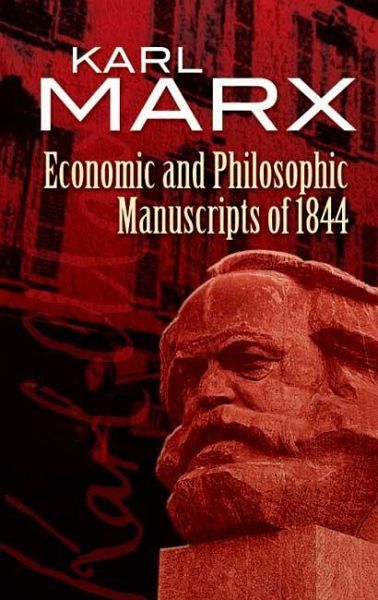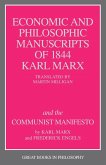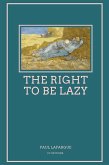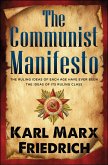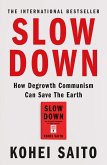Karl Marx
Economic and Philosophic Manuscripts of 1844 (eBook, ePUB)
6,99 €
6,99 €
inkl. MwSt.
Sofort per Download lieferbar

3 °P sammeln
6,99 €
Als Download kaufen

6,99 €
inkl. MwSt.
Sofort per Download lieferbar

3 °P sammeln
Jetzt verschenken
Alle Infos zum eBook verschenken
6,99 €
inkl. MwSt.
Sofort per Download lieferbar
Alle Infos zum eBook verschenken

3 °P sammeln
Karl Marx
Economic and Philosophic Manuscripts of 1844 (eBook, ePUB)
- Format: ePub
- Merkliste
- Auf die Merkliste
- Bewerten Bewerten
- Teilen
- Produkt teilen
- Produkterinnerung
- Produkterinnerung
- Weitere 8 Ausgaben:
- Gebundenes Buch
- Gebundenes Buch
- Broschiertes Buch
- Broschiertes Buch
- Broschiertes Buch
- eBook, ePUB
- eBook, ePUB
- eBook, ePUB

Bitte loggen Sie sich zunächst in Ihr Kundenkonto ein oder registrieren Sie sich bei
bücher.de, um das eBook-Abo tolino select nutzen zu können.
Hier können Sie sich einloggen
Hier können Sie sich einloggen
Sie sind bereits eingeloggt. Klicken Sie auf 2. tolino select Abo, um fortzufahren.

Bitte loggen Sie sich zunächst in Ihr Kundenkonto ein oder registrieren Sie sich bei bücher.de, um das eBook-Abo tolino select nutzen zu können.
- Geräte: eReader
- mit Kopierschutz
- eBook Hilfe
- FamilySharing(5)
Andere Kunden interessierten sich auch für
![Economic and Philosophic Manuscripts of 1844 (eBook, ePUB) Economic and Philosophic Manuscripts of 1844 (eBook, ePUB)]() Karl MarxEconomic and Philosophic Manuscripts of 1844 (eBook, ePUB)1,97 €
Karl MarxEconomic and Philosophic Manuscripts of 1844 (eBook, ePUB)1,97 €![Economic and Philosophic Manuscripts of 1844 and the Communist Manifesto (eBook, ePUB) Economic and Philosophic Manuscripts of 1844 and the Communist Manifesto (eBook, ePUB)]() Karl MarxEconomic and Philosophic Manuscripts of 1844 and the Communist Manifesto (eBook, ePUB)12,85 €
Karl MarxEconomic and Philosophic Manuscripts of 1844 and the Communist Manifesto (eBook, ePUB)12,85 €![The Right To Be Lazy (eBook, ePUB) The Right To Be Lazy (eBook, ePUB)]() Paul LafargueThe Right To Be Lazy (eBook, ePUB)1,99 €
Paul LafargueThe Right To Be Lazy (eBook, ePUB)1,99 €![The Right to Be Lazy (eBook, ePUB) The Right to Be Lazy (eBook, ePUB)]() Paul LafargueThe Right to Be Lazy (eBook, ePUB)9,95 €
Paul LafargueThe Right to Be Lazy (eBook, ePUB)9,95 €![The Communist Manifesto (eBook, ePUB) The Communist Manifesto (eBook, ePUB)]() Karl MarxThe Communist Manifesto (eBook, ePUB)1,99 €
Karl MarxThe Communist Manifesto (eBook, ePUB)1,99 €![From Marxism to Post-Marxism? (eBook, ePUB) From Marxism to Post-Marxism? (eBook, ePUB)]() Göran TherbornFrom Marxism to Post-Marxism? (eBook, ePUB)9,95 €
Göran TherbornFrom Marxism to Post-Marxism? (eBook, ePUB)9,95 €![Slow Down (eBook, ePUB) Slow Down (eBook, ePUB)]() Kohei SaitoSlow Down (eBook, ePUB)3,49 €
Kohei SaitoSlow Down (eBook, ePUB)3,49 €-
-
-
Produktdetails
- Verlag: Dover Publications
- Erscheinungstermin: 2. März 2012
- Englisch
- ISBN-13: 9780486113203
- Artikelnr.: 39138393
Dieser Download kann aus rechtlichen Gründen nur mit Rechnungsadresse in A, B, BG, CY, CZ, D, DK, EW, E, FIN, F, GR, HR, H, IRL, I, LT, L, LR, M, NL, PL, P, R, S, SLO, SK ausgeliefert werden.
- Herstellerkennzeichnung Die Herstellerinformationen sind derzeit nicht verfügbar.
Karl Heinrich Marx (5 May 1818 - 14 March 1883) was a German philosopher, economist, historian, sociologist, political theorist, journalist and socialist revolutionary. Born in Trier, Germany, Marx studied law and philosophy at university. He married Jenny von Westphalen in 1843. Due to his political publications, Marx became stateless and lived in exile with his wife and children in London for decades, where he continued to develop his thought in collaboration with German thinker Friedrich Engels and publish his writings, researching in the reading room of the British Museum. His best-known titles are the 1848 pamphlet, The Communist Manifesto, and the three-volume Das Kapital. His political and philosophical thought had enormous influence on subsequent intellectual, economic and political history, and his name has been used as an adjective, a noun and a school of social theory. Marx's critical theories about society, economics and politics - collectively understood as Marxism - hold that human societies develop through class struggle. In capitalism, this manifests itself in the conflict between the ruling classes (known as the bourgeoisie) that control the means of production and the working classes (known as the proletariat) that enable these means by selling their labour power in return for wages.[13] Employing a critical approach known as historical materialism, Marx predicted that, like previous socio-economic systems, capitalism produced internal tensions which would lead to its self-destruction and replacement by a new system known as socialism. For Marx, class antagonisms under capitalism, owing in part to its instability and crisis-prone nature, would eventuate the working class' development of class consciousness, leading to their conquest of political power and eventually the establishment of a classless, communist society constituted by a free association of producers. Marx actively pressed for its implementation, arguing that the working class should carry out organised revolutionary action to topple capitalism and bring about socio-economic emancipation.
Introduction Translator's Note on Terminology Economic and Philosophic
Manuscripts of 1844, by Karl Marx Preface Wages of Labour Profit of Capital
1. Capital 2. The Profit of Capital 3. The Rule of Capital over Labour and
the Motives of the Capitalist 4. The Accumulation of Capitals and the
Competition Amongst the Capitalists Rent of Land [Estranged Labour]
[Antithesis of Capital and Labour. Landed Property and Capital] [Private
Property and Labour. Views of the Merchantile System and Physiocracy, Adam
Smith, Ricard and His School] [Private Property and Communism. Various
Stages of Development of Communist Views. Crude, Equalitarian Communism and
Communism as Socialism Coinciding with Humaneness] [The Meaning of Human
Requirements Where There Is Private Property and Under Socialism. The
Difference Between Extravagant Wealth and Industrial Wealth. Division of
Labour in Bourgeois Society] [The Power of Money in Bourgeois Society]
[Critique of the Hegelian Dialectic and Philosophy as a Whole] Appendix
Outlines of a Critique of Political Economy by Frederick Engels
Manuscripts of 1844, by Karl Marx Preface Wages of Labour Profit of Capital
1. Capital 2. The Profit of Capital 3. The Rule of Capital over Labour and
the Motives of the Capitalist 4. The Accumulation of Capitals and the
Competition Amongst the Capitalists Rent of Land [Estranged Labour]
[Antithesis of Capital and Labour. Landed Property and Capital] [Private
Property and Labour. Views of the Merchantile System and Physiocracy, Adam
Smith, Ricard and His School] [Private Property and Communism. Various
Stages of Development of Communist Views. Crude, Equalitarian Communism and
Communism as Socialism Coinciding with Humaneness] [The Meaning of Human
Requirements Where There Is Private Property and Under Socialism. The
Difference Between Extravagant Wealth and Industrial Wealth. Division of
Labour in Bourgeois Society] [The Power of Money in Bourgeois Society]
[Critique of the Hegelian Dialectic and Philosophy as a Whole] Appendix
Outlines of a Critique of Political Economy by Frederick Engels
Introduction Translator's Note on Terminology Economic and Philosophic
Manuscripts of 1844, by Karl Marx Preface Wages of Labour Profit of Capital
1. Capital 2. The Profit of Capital 3. The Rule of Capital over Labour and
the Motives of the Capitalist 4. The Accumulation of Capitals and the
Competition Amongst the Capitalists Rent of Land [Estranged Labour]
[Antithesis of Capital and Labour. Landed Property and Capital] [Private
Property and Labour. Views of the Merchantile System and Physiocracy, Adam
Smith, Ricard and His School] [Private Property and Communism. Various
Stages of Development of Communist Views. Crude, Equalitarian Communism and
Communism as Socialism Coinciding with Humaneness] [The Meaning of Human
Requirements Where There Is Private Property and Under Socialism. The
Difference Between Extravagant Wealth and Industrial Wealth. Division of
Labour in Bourgeois Society] [The Power of Money in Bourgeois Society]
[Critique of the Hegelian Dialectic and Philosophy as a Whole] Appendix
Outlines of a Critique of Political Economy by Frederick Engels
Manuscripts of 1844, by Karl Marx Preface Wages of Labour Profit of Capital
1. Capital 2. The Profit of Capital 3. The Rule of Capital over Labour and
the Motives of the Capitalist 4. The Accumulation of Capitals and the
Competition Amongst the Capitalists Rent of Land [Estranged Labour]
[Antithesis of Capital and Labour. Landed Property and Capital] [Private
Property and Labour. Views of the Merchantile System and Physiocracy, Adam
Smith, Ricard and His School] [Private Property and Communism. Various
Stages of Development of Communist Views. Crude, Equalitarian Communism and
Communism as Socialism Coinciding with Humaneness] [The Meaning of Human
Requirements Where There Is Private Property and Under Socialism. The
Difference Between Extravagant Wealth and Industrial Wealth. Division of
Labour in Bourgeois Society] [The Power of Money in Bourgeois Society]
[Critique of the Hegelian Dialectic and Philosophy as a Whole] Appendix
Outlines of a Critique of Political Economy by Frederick Engels
